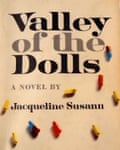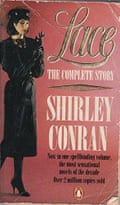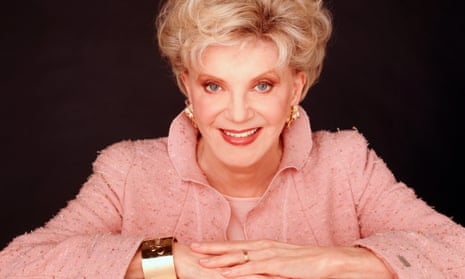It was hard not to see the death of Judith Krantz at the age of 91 last week as the end of an era. Krantz was the “queen of the bonkbuster”, those glitzy novels with their gaudy covers and snappy often one-word titles – Scruples, Lace, Rivals – that dominated commercial fiction in the late 1970s and 1980s, spinning stories of fabulous lives lived at full tilt and stuffed full of sex, secrets and shopping.
As a teenager, I thrilled to those books: to Krantz’s Scruples, in which her formidable heroine, Billy Ikehorn (nee Winthrop), essentially anticipated the hipster shopping experience by about two decades, opening the shop that gave the book its title, a perfect pleasuredome with an on-site bar in which women tried on shoes and sipped champagne while their husbands drank beer and played backgammon; to Shirley Conran’s Lace, every 80s schoolgirl’s most feverish fantasy (just ask them about the notorious goldfish scene), in which four women meet at an elite Swiss finishing school before going on to conquer the worlds of fashion, publishing, journalism and (more randomly) charity fundraising; and to Jilly Cooper’s Rivals, which gave the genre a very British spin by having her heroes compete for an ITV franchise while fitting in the odd game of naked tennis.
It might seem like a stretch to claim that everything I’ve ever learned I learned from bonkbusters, and yet in an odd way it’s true.
Their initial appeal might lie in their almost fairytale glamour – there was a reason the late, great Jackie Collins set her books largely in Hollywood, where both the stakes and the stars were high. It was a chance to escape the humdrum reality of life – particularly teenage pre-internet life where the hours stretched on for days – by diving into a luxurious world filled with backstabbing and betrayal, where women were asked “which one of you bitches is my mother?”, and glamorous but down-at-heel progeny of white Russian princes-in-exile were forced to get ahead in advertising on their own.
But behind all the Ritz and romance – Krantz’s heroines in particular were fond of a good wedding or three – something more interesting was going on. Critics often sneer at these books as vacuous and stuffed full of “trivial” concerns such as clothes, shoes and makeup (the wonderfully acerbic Angela Carter memorably described reading Krantz as like “being sealed inside a luxury shopping mall whilst being softly pelted with scented sex technique manuals”), yet they are also part of a rich tradition of novels which place women’s interior lives and, most importantly, their sexual desires centre-stage, and, crucially, they are usually, although not always, at their heart about female friendship.
Thus Lace might have a reputation as the steamiest bonkbuster of them all, a novel filled with lovingly described scenes of sex and masturbation, with erotic encounters with Swiss ski instructors, playboy princes and men about town, but no one ever really remembers the men. Instead, this is a book about the friendship between its four heroines, Maxine, Judy, Pagan and Kate, a friendship built around a secret child and intended to see them through thick and thin (or “sick and sin” as the French Maxine rather more realistically has it).
It is also a determinedly feminist book. Conran’s real interest lies not in her heroine’s marriages but in their careers, and she reserves her most lovingly detailed passages for those moments when Judy pulls off a publishing coup or Kate sneaks across the border into a war zone. Her teenage readers might have come for that goldfish but they left convinced that with the right combination of gumption and moxie and, more importantly, with the support of their friends, then any career was there for the taking.
Similarly Princess Daisy, Krantz’s second novel and my favourite, is as much about heroine Daisy’s friendship with “auto industry heiress” Kiki Kavanaugh, always present with a quick quip, as it is about her desire to support and protect her twin sister Danielle, who suffered a brain injury during their birth. And while both Daisy and Kiki are heiresses, they are heiresses who work, with Daisy, estranged from her family thanks to her spectacularly evil half-brother Ram, paying Dani’s medical bills by working as runner on a TV production company and painting society portraits on the side.
For underneath the froth, these were books written by women who not only understood the ways in which women’s lives were changing but who were eager to capture those changes on the page. Women such as Rona Jaffe, celebrated for her classic “girls in the city” novel The Best of Everything (1958), who would go on to write 1979’s Class Reunion, which followed four women from their time at Radcliffe College through bad marriages and by-and-large better careers to their college reunion 20 years later. And Lisa Alther, whose Kinflicks, published in 1976, told the riotous coming-of-age of Ginny Babcock, teen renegade turned sorority sister, lesbian, suburban mother and more.
As the 80s progressed, so the bonkbuster began to spread in different directions. Barbara Taylor Bradford created the self-made woman par excellence with A Woman of Substance, Penny Vincenzi combined tight plots with a flair for characterisation in a string of hits from Old Sins to A Question of Trust, and June Flaum Singer threw the kitchen sink at it with The Movie Set, which came with the irresistible tagline “They started out as five nice girls, but nice girls don’t survive in The Movie Set”. Best of all, perhaps, was Sally Beauman, who hit the headlines when her debut Destiny, a racy sex-stuffed tale of forbidden love, was the subject of a million-pound advance, and who would go on to write Dark Angel, an addictive blend of family house saga, mystery and secret desires which offered new possibilities for the genre.
But its queens saw no need to change. Krantz gave us I’ll Take Manhattan, in which Maxi Amberville, who at 29 “has already discarded three husbands on two continents”, bends the magazine industry to her will, Collins introduced the all-conquering Lucky Santangelo, mob daughter and Lady Boss long before the notion was an internet meme, and Cooper turned her eye to the worlds of polo, music and art while still ensuring that her heroes and heroines were only ever one sultry Cotswold evening away from stripping off and getting to it.
And that perhaps was the lesson that the best bonkbusters delivered. There’s none of the fey whimpering from the shadows of a Fifty Shades here, instead – whether writing about friendships, work or sex – these books celebrated women. They told their audience that those relationships, careers and desires were both worthwhile and wonderful, and they made their readers feel they could be wonderful too. They weren’t perfect by any means, – many have a near-pathological obsession with “the perfect weight” and there are crude insults that jar on re-reads – but the greatest of them, from Beauman and Conran to Vincenzi and Taylor Bradford, tell women not to hide in the shadows but to stand proudly centre stage. It is for that confidence – or as a bonkbuster heroine would have it, that brio – that Krantz in particular will be missed.

Page turners
Valley of the Dolls
Jaqueline Susann, 1966
“She doesn’t write, she types” bitched Gore Vidal, but Susann’s Hollywood tale is an unputdownable story of fame, excess and addiction.
Scruples
Judith Krantz, 1978
Krantz’s debut tells of ugly duckling Billy Winthrop and her rise to fashion glory thanks to … weight loss, secretarial skills and the decision to open luxury shop Scruples.
The Debutantes
June Flaum Singer, 1982
Flaum Singer drew loose inspiration from the life of the late Gloria Vanderbilt in this over-the-top story of four close friends.

Lace
Shirley Conran, 1984
Famous for its opening – “which one of you bitches is my mother?” – Conran’s tale is really a feminist saga of friendship and ambition.
Sundowners
Lesley Lokko, 2003
Lokko dragged the blockbuster into the 21st century with this addictive story of four boarding school friends which mixes astute commentary on race and politics amid the glamour.
